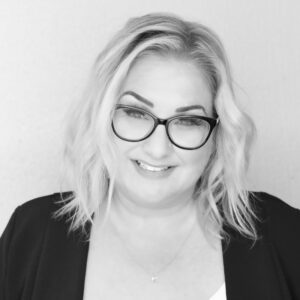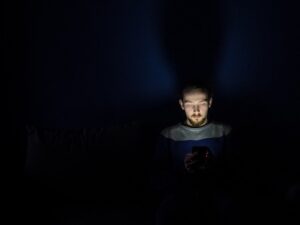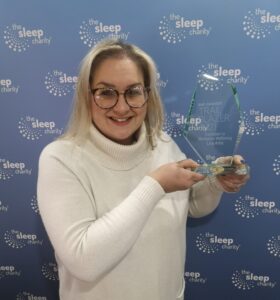SHP Speaks to Lisa Artis, Deputy CEO at The Sleep Charity, about her three top tips for a good night’s sleep, how sleep is often overlooked in the workplace and her success at being named SHP’s Trailblazer in Workplace Wellbeing for 2021.
 Lisa’s background is in PR and marketing. After she had her second child, she began marketing role at The Sleep Council, a not-for-profit organisation set up by the National Bed Federation, with the aim of creating a body that could talk about a good night’s sleep and subtlety push the importance of a good bed message.
Lisa’s background is in PR and marketing. After she had her second child, she began marketing role at The Sleep Council, a not-for-profit organisation set up by the National Bed Federation, with the aim of creating a body that could talk about a good night’s sleep and subtlety push the importance of a good bed message.
She would go on to head up The Sleep Council, developing a real interest and passion for sleep. Lisa began to explore ways to increase her knowledge of sleep, undertaking courses, including the Children Sleep Charity’s Sleep Practitioner course, which is where she crossed paths with Vicki Dawson, CEO of The Sleep Charity.
Vicki and Lisa started to work on various projects together, and soon realised that they shared many of the same values and had a similar ethos. Collaboratively between The Sleep Council and The Sleep Charity, they launched the Wake Up Call Sleep Manifesto and the Charter for Sleep Equality, in March 2020.
“It was at this time that the Children’s Sleep Charity was going through a rebrand, becoming The Sleep Charity, and The Sleep Council was too. So, we just said, ‘why are we trying to do these two things separately? Why do we not just join forces, bring the two organisations together to become a much stronger independent voice?’ And that’s where we are today.
“I have a huge passion for consumer awareness. So, I’m a big advocate of pushing sleep on the public health agenda, because of my background in PR and marketing. I am also qualified as a children’s sleep practitioner, but at The Sleep Council, I did a lot around adult sleep and corporate wellbeing, which is what I brought to The Sleep Charity.”
In December, Lisa was named the winner of SHP’s Trailblazer in Workplace Wellbeing Award for 2021.
Click here to listen to this interview in full.
What is The Sleep Charity and the work it does to support businesses and individuals?
Lisa Artis (LA): “We we are a small charity, but an award-winning national charity, and we’ve got a huge mission to empower the nation to sleep better. We are strong believers that if we can share information about sleep education, it can really help people to manage their own sleep.
“Because we are not medical professionals, we are very much looking at sleep across the life course and how we can look at preventative sleep measures. So, starting with children, right through to adults and in the workplace.
“We’re involved in campaigning, research projects, individual sleep support, as well as delivering training. We are now working closely with corporate organisations and have a specific training course that we can offer to employers. We also do a lot of we’ve one-off commissioned work, including webinars and the like, to support awareness weeks.
“I think, while COVID has been a really challenging, difficult time, it has really brought home the message about health and wellbeing. So, we are starting to see that that interest now in the workplace, and sleep is a huge part of that.”
Why is sleep so important when it comes to people’s health and wellbeing and how does a good night’s sleep help you get through the working day?
(LA): “Sleep has a huge impact on both our physical and mental health and wellbeing. It protects our emotional mental health, because we become more resilient, mood is higher, we’re more motivated, more energised and enthusiastic about our day-to-day life and the work that we do.
“Sleep also improves our physical health. Our weight is managed better when we sleep well, we’re less prone to illness, and there is an enormous positive impact on our whole lifestyle as well. So, our relationships are better when we sleep, we’re more sociable.
“If we don’t sleep well, we’re actually more costly to society, from a health perspective, as well as having the potential to be more costly in the workplace.”
How can lack of sleep affect people at work, particularly in hazardous environments?
(LA): “When we don’t sleep well our concentration is impaired, we’ve got poorer judgment, there is an increase chance of making errors. There have been studies which have said going to work when you are sleep deprived is as bad for your concentration and reaction times, as going to work drunk.
“When you’ve had a lack of sleep, it can impair your judgement, which can affect things like your driving, and it can also impact your memory too, making you more forgetful and hampering your problem solving and decision-making abilities.”
Have you noticed a coloration between then increase in screen time for people and a lack of sleep?
 (LA): “Absolutely! Technology is a wonderful thing, but at the same time, it has had a detrimental impact on our sleep, and we often don’t even realise. So, we hear all the time about how the blue light from the devices has an impact on his sleep. I think that’s quite well known now. But it’s not just that, it’s the stimulation you get from the devices as well.
(LA): “Absolutely! Technology is a wonderful thing, but at the same time, it has had a detrimental impact on our sleep, and we often don’t even realise. So, we hear all the time about how the blue light from the devices has an impact on his sleep. I think that’s quite well known now. But it’s not just that, it’s the stimulation you get from the devices as well.
“What we’ve found is that the biggest effect it has, is on what we call sleep latency, which is the time it takes for you to fall asleep. So, people think they’re going to bed at 10pm because, they’ve gone upstairs, they’ve brushed their teeth and got into bed. But actually, what they do is they pick up their phone one last time and before you know it, 45 minutes have passed, and they are then trying to get to sleep, which may take 15-20 minutes. So, people still think their bedtime is 10pm, when realistically it’s actually 11pm.
“I think there’s a really good reason to put a boundary on screen time. We’re not the screen police and we don’t think people should not go on the phones, because it is part and parcel of everyday life, but it’s actually just putting those boundaries in place and setting a time to actually switch off, can be really good for you and set a good example to others, like your kids.”
How did you feel when you learned you had been shortlisted and subsequently the winner, of SHP’s Trailblazer in Workplace Wellbeing in 2021?
 (LA): “To even be shortlisted was a huge achievement, especially with the calibre of people that I was up against, they were all amazing. Then, to win, I would say professionally this is probably one of the best things that’s ever happened to me. Workplace wellbeing is something that I’m really passionate about. When I joined the charity, this was an area that I really wanted to focus on and make it my own in the charity, so to recognised for this work is fantastic.
(LA): “To even be shortlisted was a huge achievement, especially with the calibre of people that I was up against, they were all amazing. Then, to win, I would say professionally this is probably one of the best things that’s ever happened to me. Workplace wellbeing is something that I’m really passionate about. When I joined the charity, this was an area that I really wanted to focus on and make it my own in the charity, so to recognised for this work is fantastic.
“For me, it highlights that sleep as part of the workplace now and really bringing it to the attention of employers.”
You said after you won the award, that sleep is often overlooked in the workplace. Why do you think that is, and how do you think this award will help in terms of raising awareness of the importance of sleep?
(LA): “It is overlooked in the workplace, but it’s also overlooked generally in life too. When it comes to health and wellbeing, we focus a lot of effort on things like diet and nutrition, on exercising and moving more and also mental health. All of these things are really important, but we often neglect, sleep, which actually feeds into all these other areas.
“I think one of the reasons sleep is overlooked is because it’s complicated and quite often not a quick fix. Employers can do good things around advocating exercising, by maybe giving gym memberships out as part of occupational health and HR strategies, but what can you do to improve somebody’s sleep?”
“Sleep is really individual. You might absolutely function perfectly well on six-and-a-half hours sleep and can function brilliantly well and you feel fine, whereas I might need like eight-and-a-half-hours to feel the same way. So, it’s quite difficult to kind of put that message out there about what’s the ideal.
“There are no real pathways either for sleep. I do think it is changing, but there needs to be a real push on the public health agenda around sleep. It’s one of those funny subjects which employees maybe don’t want to bring to the attention of their line managers, because there’s still a bit of stigma around it in terms of not wanting to be perceived as lazy. I think it’s a real tricky conversation, because a lot of reasons why people can’t sleep are things that really change quickly or control.
“Someone who is sleep deprived can be a lot harder to pinpoint for a line manager or employer and the reasons behind it are not always obvious. It could be that it’s a mum who’s back at work, but their baby has been up several times in the night. It could be a woman who’s going through the menopause. It could just be a young male adult who’s just finding it tricky to fall asleep at 10pm because they’re more of a night owl and their bedtime is more like 1am, but they still need to get up at 6am. So, they end up chronically sleep deprived.”
You have some names on your board that our readers will know well, such as Karen McDonnell from RoSPA and Simon Blake from Mental Health First Aid, what insight do they bring and how have they helped with your messaging?
(LA): “When we expanded from the Children Sleep Charity, one of the things that we wanted to do, was to have a voluntary expert advisory board. A group of people who could help shape the future of sleep support nationally and play a vital part in providing that advice and a challenge and scrutiny on key issues and key programs that we were doing.
“We don’t profess to have the answers to all areas, because for instance, we can talk the sleep, but we can’t always talk the menopause bit. We know that sleep has an impact when people are going through the menopause, so it was important for us to have a menopause expert on the board.
“Karen McDonnell is a huge help in terms talking around driver fatigue, which is a massive issue and something that we’re seeing an increase almost year on year, because there’s an increasing amount of people doing shift work.
“With Simon, from MHFA, we’ve already highlighted the close relationship between sleep and mental health, so we need to ensure that the programs that we’re delivering really take that into consideration.”
You touched on earlier, can you talk a little more about the Charter for Sleep Equality and what that is?
(LA): “As part of our manifesto launch in March 2020, we also launched our Charter for Sleep Equality. This was really calling on individuals, businesses, organisations who wanted to think about employee wellbeing in the workplace and wanted to help promote good sleep amongst either employees or students or even a wider community. The Charter asking them to pledge their support to sign up to it, giving them that badge to say, ‘we are we are interested in our employee wellbeing, we do take it seriously and we’ve pledged this support to the Charter.
“When we launched it, we had around 100 businesses sign up. We then went into the pandemic and things stalled a little bit. But, off the back of this award and the success we’ve had with the workplace sleep ambassadors, my plan is to go and really put some more life back into this. There is a nice Workplace Sleep Ambassador course, where we can join the two things up together.
What are your top 3 tips for a good night’s sleep?
(LA): “I think there’s three things that everybody could do, the three ‘R’s, which doesn’t take too much hard work.”
- Restful environment. “I think the first thing that everyone can do right away, is have a look at their bedroom and ask themselves, ‘is it right for sleep, is it right for my sleep?’ Ideally it should be cool, around 16 to 18 degrees. Most people like it to be quiet. It should be dark, because light increases your Melatonin production, which stops you feeling sleepy. Ideally it should be clutter free. Even though you sleep with your eyes closed, you don’t want the last thing for you to see before you go to bed to be a mess. And finally, make sure you’ve got a good bed, good pillows and nice bedding, so that you feel comfortable and relaxed.
- Regular hours. “Look at strengthening your internal body clock, your circadian rhythm, by going to bed and getting up at the same time all the time. That programs the mind and the body to sleep better. We all we all thrive on routine. Kids often have a bedtime routine, but as we get older, we let that go. It’s not always easy, especially with shift work, so it’s about finding what works for you. But, where you can, if you can try to consistently stay within an hour of that same bedtime and same wake up time, it helps to keep that body clock on track.”
- Routine. “I touched on it earlier with thinking you go to bed at 10pm and then staying up another hour on your phone, so it’s just factoring in that wind down routine. Set aside 30 minutes to an hour to help yourself to de-stress and forget about the day, forget about work and switch off. Set that boundary for yourself and switch off your phones and devices and find something you enjoy doing that will relax you, like having a bath or reading a book, so that you’re in the right frame of mind for sleep.
“It’s not a big overhaul of your lifestyle, but they’re just some little things that some people could put into place straight away and they might find they have a huge impact on their sleep.
Finally, how can people find out more about The Sleep Charity, download resources and contact you for support?
(LA): “Our website is a really comprehensive resource packed with lots of downloadable advice sheets and things like that.
“We also have a National Sleep Helpline, which runs Sunday to Thursday, 7pm to 9pm. The number is 0330 530 541.
“Anyone who’s got a sleep issue can phone that and speak to one of our trained sleep advisers.
“If you’re interested in the Charter for Sleep Equality, or just for any other kind of inquiry, you can just contact us on [email protected].
Additional Resources
National Sleep Helpline – 0330 530 541

